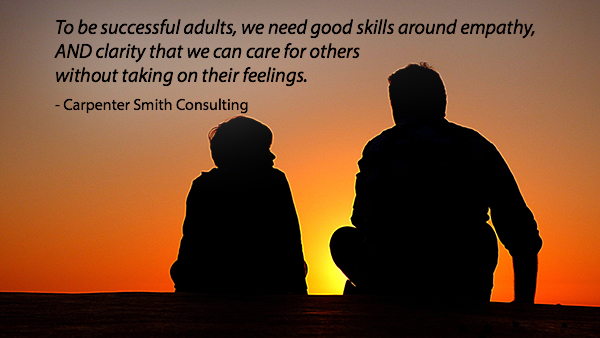
Over the past weeks, we have been talking about Daniel Goleman’s four components of Emotional Intelligence and how to translate each into action. Last week, we answered a question that a number of people from the Monday Morning Business Coach community asked, “What if I just miss the people stuff?”
This week we want to speak to another issue addressed by our readers, a tendency to lose themselves in others’ pain.
If the pain of others emotionally paralyzes you, you may be struggling to hold on to your emotional center as you empathize with others. People who are very sensitive to the experiences of others can sometimes blur the boundaries between their own emotions and the emotions of people they care about.
As children, we are taught to “imagine how someone else is feeling” in order to learn empathy. To be successful adults, we need good skills around empathy and clarity that we can care for others without taking on their feelings.
Let’s take Maggie. She’s a successful professional woman who wants to be promoted. When we asked her what she thought was keeping her from advancing, she described her belief that she wasn’t “tough” enough to lead. In exploring her interactions with others, it was clear that her definition of “tough” was to stop caring how others felt.
From our perspective, she didn’t need to be tough, what she needed was better boundaries between her own emotions and the emotions of those around her. You see Maggie would feel the emotions of others so strongly that she had great difficulty leading them effectively.
She wasn’t good at giving people feedback on performance concerns, challenging decisions she believed were problematic, and asking her team to keep clear lines between their personal and their professional lives.
As she reflected on her struggles, she recognized that she felt the pain, fear, and shame of others almost more than they did; therefore as a manager she stopped short of effectively setting stretch goals, pushing people to perform at their best, and moving people out of roles that were not good a fit.
To support Maggie, we asked her to remember these 3 things:
- The lack of clear boundaries between her experiences and those of the people she manages is bad for her career and also bad for their careers. People need clear expectations and feedback on their performance so that they have the information they need to refine their behaviors and increase their effectiveness. Her sense that she needed to protect them from their pain essentially kept them from growing in their skill and impact.
- She can care deeply for her team, honoring their pain, fear, or shame while not taking it on as her own. We reviewed examples of responses that would help her show she cared while allowing the other person to have their own experience. Words like:
- Your success matters to me and I know this feedback is hard to hear; and I want you to know what needs to be done to truly succeed in this role.
- I believe you have the best of intentions in the way you are managing your staff but in these (specific) ways, your behavior is out of alignment with our values in managing people— how can I help you develop some new patterns?
- Over the next 3 months, I am going to be coaching you on your skills and if you are not more successful, I am going to help you explore other roles that are more in keeping with your skill set.
- Your success matters to me and I know this feedback is hard to hear; and I want you to know what needs to be done to truly succeed in this role.
- She will likely need to continue to get coaching to support her as she creates a stronger boundary around her emotions and those of the people she manages. She has had a lot of practice losing herself in others’ pain and this new approach, while increasing her effectiveness, will feel foreign, and at times she may feel like she is being uncaring. Coaching will allow her to practice this new skill over time.
We encourage you to take some time this week to explore if you lose yourself in others’ pain, and explore ways to create boundaries that acknowledge that you are two separate beings. You are responsible for being respectful and kind in your approach to others, and it is also your responsibility to help your team members genuinely understand their skill levels and the impact of their behaviors on their performance.
